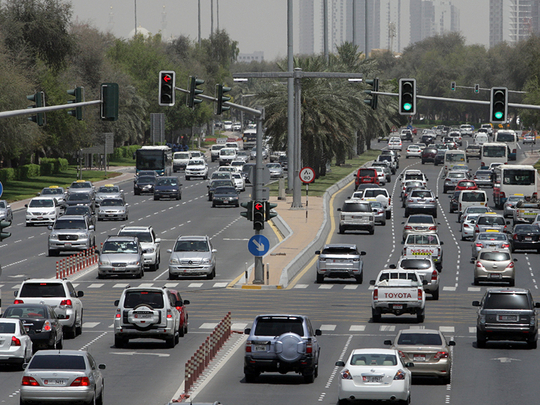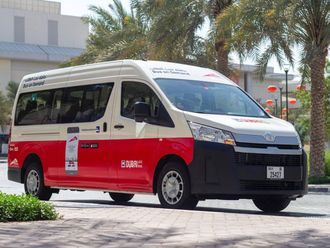
Abu Dhabi: Smartphone GPS mode may become a new way for authorities to combat congestion in rapidly growing cities like Abu Dhabi and Dubai, experts at a traffic conference said in the capital.
Having ‘resident sensors’ as a means to transmit information about the volume of people in a given location is one of the elements currently being studied as part of the Smart Traffic Systems initiatives being undertaken across the UAE.
Using this technique, authorities will be able to access the location of individuals as soon as they turn on their smartphone GPS system. However, members of the public may have fears about becoming an unsuspecting source of information to government authorities.
Dr Saeed Al Daheri, an IT expert, independent academic researcher and former adviser to the Minister of Foreign Affairs, told Gulf News: “Transport authorities in this case would not necessarily require specific details about a person, such as their name, but would only need the data provided from that individual that will help them see trends in traffic. This will enable decision makers to make developments to the road to help deal with congestion issues, for example.”
Using people as sensors is a ‘smarter’ version of the infra-red cameras currently used in Abu Dhabi. These are being placed at over 43 intersections and can measure the number of vehicles, pedestrians, average speed and weight of vehicles in four directions. Authorities can then collect and analyse this data to come up with appropriate solutions to run over accidents and collisions, for example. This has led to a reduction in the number of accidents due to running red lights this year, the Abu Dhabi Police announced earlier.
Majid Mohammad Al Shamsi, deputy director and traffic tolling section manager at the RTA, explained that vehicle counters placed at locations such as Salik toll booths are one way of gathering information necessary for road developments.
Salik helps reduce traffic
“The Salik counters have actually revealed that the number of vehicles has decreased since the installation of the toll booths. This is a positive indicator because less congestion means happier road users and less tension on the streets in general,” he said.
“Developers often require our assistance in calculating the flow of traffic in an area in order to base their future expansion plans on this data. It also tells us whether it’s worth it to signalise roundabouts, for example, among other road works,” he added.
Despite these changes, Al Daheri noted that some changes being adopted are overdue but their presence is welcome and necessary.
“For the transportation sector, ‘smart’ might mean realising that building more roads by itself does not solve the problem of congestion, and [it means] taking a clear decision to focus more on public transport and technologies,” said Maitha Bin Udai, CEO of the Traffic and Roads Agency at the RTA, during her opening speech.
Hamid Iravani, Transportation Planning Director at Parsons engineering firm, said: “Over the last two decades, many cities worldwide have realised that curing traffic congestion by just widening roads and building extensive highway systems is like curing obesity by loosening your belt.”
Al Daheri was speaking on the sidelines of Smart Traffic Middle East 2015 in the capital.
Meanwhile, aiming to become the smartest city in the world, Dubai has announced plans to make all its parking spaces visible on the Dubai Roads and Transport Authority (RTA) smartphone application by the end of 2016.
Recently, the RTA said that the availability of parking spaces in Dubai Mall has become accessible on the RTA app. Soon, the RTA revealed yesterday, Dubai Festival City and Mall of the Emirates will follow.
Parking vacancies
“Dubai Mall already contained the infrastructure that we needed to make this service available to the public. Under our current pilot project for the Smart Parking systems, parking vacancies between intersections zero and one, between the World Trade Centre and the Dubai Mall, will also become accessible to RTA app users,” said Adel Mohammad Al Marzouqi, director of the parking department at the RTA.










